Gabe Allen
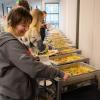 And the winner is… INSTAAR presented four awards and three summer scholarships at the annual spring celebration luncheon last week. Recipients were commended for their impactful efforts at the institute, in the scientific community and beyond.
And the winner is… INSTAAR presented four awards and three summer scholarships at the annual spring celebration luncheon last week. Recipients were commended for their impactful efforts at the institute, in the scientific community and beyond.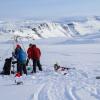 A new investigation, led by INSTAAR affiliate David Harning, uncovers a story of ecosystem resilience at a lake in coastal Iceland. The analysis could aid future conservation and climate modeling efforts.
A new investigation, led by INSTAAR affiliate David Harning, uncovers a story of ecosystem resilience at a lake in coastal Iceland. The analysis could aid future conservation and climate modeling efforts.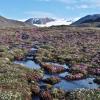 A team of 54 researchers, including Sarah Elmendorf, analyzed more than 42,000 field records of Arctic plant communities over a span of 41 years. Their insights are essential to understanding how Arctic environments are changing in the modern era.
A team of 54 researchers, including Sarah Elmendorf, analyzed more than 42,000 field records of Arctic plant communities over a span of 41 years. Their insights are essential to understanding how Arctic environments are changing in the modern era.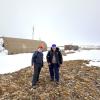 The chancellor recently visited the Mountain Research Station, where INSTAAR faculty gave a primer on climate and ecological science at the site. The group also made a trip up to the tundra lab, a remote research station at 11,500 feet above sea level.
The chancellor recently visited the Mountain Research Station, where INSTAAR faculty gave a primer on climate and ecological science at the site. The group also made a trip up to the tundra lab, a remote research station at 11,500 feet above sea level.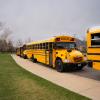 More than 200 students from Angevine Middle School recently visited INSTAAR, where researchers led hands-on demonstrations. The goal of the showcase is to inspire future scientists at an impressionable age.
More than 200 students from Angevine Middle School recently visited INSTAAR, where researchers led hands-on demonstrations. The goal of the showcase is to inspire future scientists at an impressionable age.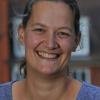 Vriend, an expert in avalanches and sand dunes, will join INSTAAR as a senior member of the directorate. Institute leadership hopes her appointment will strengthen ties with the College of Engineering and Applied Science.
Vriend, an expert in avalanches and sand dunes, will join INSTAAR as a senior member of the directorate. Institute leadership hopes her appointment will strengthen ties with the College of Engineering and Applied Science. INSTAAR researchers investigate fundamental questions about ecosystems, climate systems and landscapes. These six stories highlight the environmental research that the institute is doing in 2025.
INSTAAR researchers investigate fundamental questions about ecosystems, climate systems and landscapes. These six stories highlight the environmental research that the institute is doing in 2025.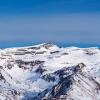 A new modeling tool from INSTAAR provides weekly snow-water equivalent estimates for the entire Western US. It has already caught the attention of local and regional water managers.
A new modeling tool from INSTAAR provides weekly snow-water equivalent estimates for the entire Western US. It has already caught the attention of local and regional water managers.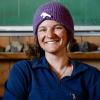 Ruef is the third recipient of the summer fellowship created in honor of a now-passed INSTAAR alum. She will use the funding for snow science research on the Juneau Ice Field in Alaska this summer.
Ruef is the third recipient of the summer fellowship created in honor of a now-passed INSTAAR alum. She will use the funding for snow science research on the Juneau Ice Field in Alaska this summer.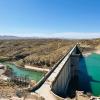 Abby Eckland, Irina Overeem and collaborators investigate how a reservoir on the Rio Grande buries organic carbon beneath layers of sediment. The researchers found that the process is amplified during drought and flash floods.
Abby Eckland, Irina Overeem and collaborators investigate how a reservoir on the Rio Grande buries organic carbon beneath layers of sediment. The researchers found that the process is amplified during drought and flash floods.

